By Matt Applegate · Tuesday, May 6, 2014 As an occasional feature on TELOSscope, we highlight a past Telos article whose critical insights continue to illuminate our thinking and challenge our assumptions. Today, Matt Applegate looks at Arshi Pipa’s “Gramsci as a (Non) Literary Critic” from Telos 57 (Fall 1983).
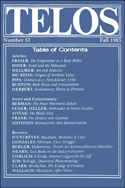 Arshi Pipa’s “Gramsci as a (Non) Literary Critic” is more than a short biography and description of Antonio Gramsci’s inquiries into literary criticism. It also provokes the reader to meditate on the political conditions of literary criticism as an intellectual practice. Gramsci is a controversial figure in the history of literary criticism for at least two reasons, according to Pipa. First, his political work remains more prominent than his literary criticism. When one thinks of Gramsci as a writer and historical figure, his literary criticism might not even register, given his political writing and influence. Second, Gramsci’s politics serve as the impetus for his intellectual projects, thus also providing potential grounds to dismiss or ignore his aesthetic analyses. To be sure, Gramsci is a controversial political figure. In 1921 Gramsci co-founded and led the Communist Party of Italy in opposition to fascism, and was later arrested by fascist police under Mussolini, ultimately dying in prison in 1937. Perhaps his most famous collection of writings, Prison Notebooks, was completed while he was incarcerated between 1926 and 1937. Yet, it is precisely Gramsci’s controversial style and political will that draw Pipa to his work and allow him to question literary criticism as an enduring intellectual practice. Arshi Pipa’s “Gramsci as a (Non) Literary Critic” is more than a short biography and description of Antonio Gramsci’s inquiries into literary criticism. It also provokes the reader to meditate on the political conditions of literary criticism as an intellectual practice. Gramsci is a controversial figure in the history of literary criticism for at least two reasons, according to Pipa. First, his political work remains more prominent than his literary criticism. When one thinks of Gramsci as a writer and historical figure, his literary criticism might not even register, given his political writing and influence. Second, Gramsci’s politics serve as the impetus for his intellectual projects, thus also providing potential grounds to dismiss or ignore his aesthetic analyses. To be sure, Gramsci is a controversial political figure. In 1921 Gramsci co-founded and led the Communist Party of Italy in opposition to fascism, and was later arrested by fascist police under Mussolini, ultimately dying in prison in 1937. Perhaps his most famous collection of writings, Prison Notebooks, was completed while he was incarcerated between 1926 and 1937. Yet, it is precisely Gramsci’s controversial style and political will that draw Pipa to his work and allow him to question literary criticism as an enduring intellectual practice.
Continue reading →
By Robert Wyllie · Tuesday, January 14, 2014 As an occasional feature on TELOSscope, we highlight a past Telos article whose critical insights continue to illuminate our thinking and challenge our assumptions. Today, Robert Wyllie looks at Norberto Bobbio’s “Is There a Marxist Theory of the State?” from Telos 35 (Spring 1978).
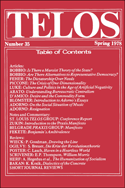 Norberto Bobbio’s 1978 article “Is There a Marxist Theory of the State?” marks a turning point in the history of Telos. The “red decade” was coming to a close in the mid-1970s, and the New Left was falling into disarray. Hence, Bobbio writes an epitaph in this 1978 article, which makes the convincing case that the Left was never able to develop a political theory that included a positive concept of the political state. In the years following Bobbio’s article, the Telos group would begin to look elsewhere. As Paul Piccone and Gary Ulmen later explained, “Telos‘ initial interest in [Carl] Schmitt’s work was triggered in the 1980s by the realization, in the collapse of the New Left and under the influence of Norberto Bobbio’s criticism, that the Left in general and Marxism in particular had no political theory.”[1] Bobbio moved Telos away from “revolution, dialectic, commodity fetishism, liberation, alienation, and monopoly capitalism”[2] to Carl Schmitt, federalism, and populism. Norberto Bobbio’s 1978 article “Is There a Marxist Theory of the State?” marks a turning point in the history of Telos. The “red decade” was coming to a close in the mid-1970s, and the New Left was falling into disarray. Hence, Bobbio writes an epitaph in this 1978 article, which makes the convincing case that the Left was never able to develop a political theory that included a positive concept of the political state. In the years following Bobbio’s article, the Telos group would begin to look elsewhere. As Paul Piccone and Gary Ulmen later explained, “Telos‘ initial interest in [Carl] Schmitt’s work was triggered in the 1980s by the realization, in the collapse of the New Left and under the influence of Norberto Bobbio’s criticism, that the Left in general and Marxism in particular had no political theory.”[1] Bobbio moved Telos away from “revolution, dialectic, commodity fetishism, liberation, alienation, and monopoly capitalism”[2] to Carl Schmitt, federalism, and populism.
Continue reading →
By Linas Jokubaitis · Thursday, September 26, 2013 As an occasional feature on TELOSscope, we highlight a past Telos article whose critical insights continue to illuminate our thinking and challenge our assumptions. Today, Linas Jokubaitis looks at Paul Piccone’s “Lukács’s History and Class Consciousness Half a Century Later,” from Telos 4 (Fall 1969).
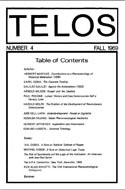 In 1969, when Paul Piccone wrote “Lukács’s History and Class Consciousness Half a Century Later,” almost fifty years had passed since the publication of Georg Lukács’s magnum opus. Piccone wrote this essay to mark that anniversary, and he argued that this work was an “underground classic.” Moreover, he asserted that this book was essential for any analysis of modern thought. According to Piccone, everyone attempting to understand and overcome the ideological crisis of Marxism would be wise to consult this book. In 1969, when Paul Piccone wrote “Lukács’s History and Class Consciousness Half a Century Later,” almost fifty years had passed since the publication of Georg Lukács’s magnum opus. Piccone wrote this essay to mark that anniversary, and he argued that this work was an “underground classic.” Moreover, he asserted that this book was essential for any analysis of modern thought. According to Piccone, everyone attempting to understand and overcome the ideological crisis of Marxism would be wise to consult this book.
Continue reading →
By Telos Press · Monday, September 16, 2013 Karel Kosík and Dialectics of the Concrete Prague, June 4–6, 2014
A conference organised by the Department for the Study of Modern Czech Philosophy, Institute of Philosophy, Academy of Sciences of the Czech Republic.
In 1963 Karel Kosík published his path-breaking book Dialectics of the Concrete. It made an impact on both Marxist and non-Marxist thinkers, in Czechoslovakia and throughout the world. In this work Kosík set for himself an ambitious task—to re-think the basic concepts of the Marxist philosophical tradition and to employ them in the analysis of social reality. In the course of his analysis he touched on a wide array of issues that are still relevant today, including the problem of mystification or the “pseudo-concrete,” the social role of art, the conception of reality as a concrete totality, the conception of the human being as an onto-formative being, the systematic connection between labour and temporality, the relationship between praxis and labour, and the explanatory power of the dialectical method.
Continue reading →
By Yonathan Listik · Tuesday, April 23, 2013
As an occasional feature on TELOSscope, we highlight a past Telos article whose critical insights continue to illuminate our thinking and challenge our assumptions. Today, Yonathan Listik looks at Cornelius Castoriadis’s “Socialism and Autonomous Society,” from Telos 43 (Spring 1980).
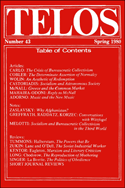 Cornelius Castoriadis’s opening line in “Socialism and Autonomous Society”—”Henceforth, the terms ‘socialism’ and ‘communism’ will have to be abandoned”—clearly indicate that he is breaking with orthodox Marxism. But one must not rush to a conclusion since upon closer inspection the dissonances are not that relevant to Marx’s overall project as presented by Castoriadis. His criticism of notions such as the “dictatorship of the proletariat” could automatically place him outside the Marxist discourse. Nevertheless he manages to illustrate, even within orthodox Marxism, the minor position of canonical notions, compared to Marx’s essential project of an autonomous society: a society composed of free and sovereign people. Cornelius Castoriadis’s opening line in “Socialism and Autonomous Society”—”Henceforth, the terms ‘socialism’ and ‘communism’ will have to be abandoned”—clearly indicate that he is breaking with orthodox Marxism. But one must not rush to a conclusion since upon closer inspection the dissonances are not that relevant to Marx’s overall project as presented by Castoriadis. His criticism of notions such as the “dictatorship of the proletariat” could automatically place him outside the Marxist discourse. Nevertheless he manages to illustrate, even within orthodox Marxism, the minor position of canonical notions, compared to Marx’s essential project of an autonomous society: a society composed of free and sovereign people.
Continue reading →
By James Santucci · Tuesday, April 9, 2013 As an occasional feature on TELOSscope, we highlight a past Telos article whose critical insights continue to illuminate our thinking and challenge our assumptions. Today, James Santucci looks at François George’s “Reading Althusser,” from Telos 7 (Spring 1971).
François George believes that Louis Althusser does not deserve his reputation, and he wants to prove it to you. He writes:
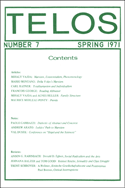 Since the mainstay of [Althusser’s] thought is its “rigor,” we will demonstrate that it is the least rigorous of all, taking as the principal example his recent work, Lenine et la Philosophic. The occasion for the following discussion is a conference in an extremely academic context: the French Society of Philosophy. Naturally, Althusser feels uneasy in this situation. Marxists, for whom thought should be practical, must seek to transform society rather than to exert themselves in these closed contexts. Was he forced to attend? Althusser accepts his role only by dismissing it. . . . Why has he come, if he rejects this degraded form of philosophy and human relations? He is interested only in the justification of this rejection or, in his own words, this denial: “the only possible communications and discussions are scientific ones.” Under the pretext of attacking the meaninglessness of the philosophical gatherings in which he participates, Althusser rejects all non-scientific human communications as a scientist addressing a “scientific society.” Evidently, then, Althusser attends the French Society of Philosophy conference because he lacks the qualifications required by the international congress on astrophysics. All would go well, said Proudhon, when the government’s power was replaced by that of the Academy of Sciences—which should not be confused with the workers’ councils. (73–74) Since the mainstay of [Althusser’s] thought is its “rigor,” we will demonstrate that it is the least rigorous of all, taking as the principal example his recent work, Lenine et la Philosophic. The occasion for the following discussion is a conference in an extremely academic context: the French Society of Philosophy. Naturally, Althusser feels uneasy in this situation. Marxists, for whom thought should be practical, must seek to transform society rather than to exert themselves in these closed contexts. Was he forced to attend? Althusser accepts his role only by dismissing it. . . . Why has he come, if he rejects this degraded form of philosophy and human relations? He is interested only in the justification of this rejection or, in his own words, this denial: “the only possible communications and discussions are scientific ones.” Under the pretext of attacking the meaninglessness of the philosophical gatherings in which he participates, Althusser rejects all non-scientific human communications as a scientist addressing a “scientific society.” Evidently, then, Althusser attends the French Society of Philosophy conference because he lacks the qualifications required by the international congress on astrophysics. All would go well, said Proudhon, when the government’s power was replaced by that of the Academy of Sciences—which should not be confused with the workers’ councils. (73–74)
Continue reading →
|
|
 Arshi Pipa’s “Gramsci as a (Non) Literary Critic” is more than a short biography and description of Antonio Gramsci’s inquiries into literary criticism. It also provokes the reader to meditate on the political conditions of literary criticism as an intellectual practice. Gramsci is a controversial figure in the history of literary criticism for at least two reasons, according to Pipa. First, his political work remains more prominent than his literary criticism. When one thinks of Gramsci as a writer and historical figure, his literary criticism might not even register, given his political writing and influence. Second, Gramsci’s politics serve as the impetus for his intellectual projects, thus also providing potential grounds to dismiss or ignore his aesthetic analyses. To be sure, Gramsci is a controversial political figure. In 1921 Gramsci co-founded and led the Communist Party of Italy in opposition to fascism, and was later arrested by fascist police under Mussolini, ultimately dying in prison in 1937. Perhaps his most famous collection of writings, Prison Notebooks, was completed while he was incarcerated between 1926 and 1937. Yet, it is precisely Gramsci’s controversial style and political will that draw Pipa to his work and allow him to question literary criticism as an enduring intellectual practice.
Arshi Pipa’s “Gramsci as a (Non) Literary Critic” is more than a short biography and description of Antonio Gramsci’s inquiries into literary criticism. It also provokes the reader to meditate on the political conditions of literary criticism as an intellectual practice. Gramsci is a controversial figure in the history of literary criticism for at least two reasons, according to Pipa. First, his political work remains more prominent than his literary criticism. When one thinks of Gramsci as a writer and historical figure, his literary criticism might not even register, given his political writing and influence. Second, Gramsci’s politics serve as the impetus for his intellectual projects, thus also providing potential grounds to dismiss or ignore his aesthetic analyses. To be sure, Gramsci is a controversial political figure. In 1921 Gramsci co-founded and led the Communist Party of Italy in opposition to fascism, and was later arrested by fascist police under Mussolini, ultimately dying in prison in 1937. Perhaps his most famous collection of writings, Prison Notebooks, was completed while he was incarcerated between 1926 and 1937. Yet, it is precisely Gramsci’s controversial style and political will that draw Pipa to his work and allow him to question literary criticism as an enduring intellectual practice.  Norberto Bobbio’s 1978 article “Is There a Marxist Theory of the State?” marks a turning point in the history of Telos. The “red decade” was coming to a close in the mid-1970s, and the New Left was falling into disarray. Hence, Bobbio writes an epitaph in this 1978 article, which makes the convincing case that the Left was never able to develop a political theory that included a positive concept of the political state. In the years following Bobbio’s article, the Telos group would begin to look elsewhere. As Paul Piccone and Gary Ulmen later explained, “Telos‘ initial interest in [Carl] Schmitt’s work was triggered in the 1980s by the realization, in the collapse of the New Left and under the influence of Norberto Bobbio’s criticism, that the Left in general and Marxism in particular had no political theory.”[1] Bobbio moved Telos away from “revolution, dialectic, commodity fetishism, liberation, alienation, and monopoly capitalism”[2] to Carl Schmitt, federalism, and populism.
Norberto Bobbio’s 1978 article “Is There a Marxist Theory of the State?” marks a turning point in the history of Telos. The “red decade” was coming to a close in the mid-1970s, and the New Left was falling into disarray. Hence, Bobbio writes an epitaph in this 1978 article, which makes the convincing case that the Left was never able to develop a political theory that included a positive concept of the political state. In the years following Bobbio’s article, the Telos group would begin to look elsewhere. As Paul Piccone and Gary Ulmen later explained, “Telos‘ initial interest in [Carl] Schmitt’s work was triggered in the 1980s by the realization, in the collapse of the New Left and under the influence of Norberto Bobbio’s criticism, that the Left in general and Marxism in particular had no political theory.”[1] Bobbio moved Telos away from “revolution, dialectic, commodity fetishism, liberation, alienation, and monopoly capitalism”[2] to Carl Schmitt, federalism, and populism.  In 1969, when Paul Piccone wrote “Lukács’s History and Class Consciousness Half a Century Later,” almost fifty years had passed since the publication of Georg Lukács’s magnum opus. Piccone wrote this essay to mark that anniversary, and he argued that this work was an “underground classic.” Moreover, he asserted that this book was essential for any analysis of modern thought. According to Piccone, everyone attempting to understand and overcome the ideological crisis of Marxism would be wise to consult this book.
In 1969, when Paul Piccone wrote “Lukács’s History and Class Consciousness Half a Century Later,” almost fifty years had passed since the publication of Georg Lukács’s magnum opus. Piccone wrote this essay to mark that anniversary, and he argued that this work was an “underground classic.” Moreover, he asserted that this book was essential for any analysis of modern thought. According to Piccone, everyone attempting to understand and overcome the ideological crisis of Marxism would be wise to consult this book.  Cornelius Castoriadis’s opening line in “Socialism and Autonomous Society”—”Henceforth, the terms ‘socialism’ and ‘communism’ will have to be abandoned”—clearly indicate that he is breaking with orthodox Marxism. But one must not rush to a conclusion since upon closer inspection the dissonances are not that relevant to Marx’s overall project as presented by Castoriadis. His criticism of notions such as the “dictatorship of the proletariat” could automatically place him outside the Marxist discourse. Nevertheless he manages to illustrate, even within orthodox Marxism, the minor position of canonical notions, compared to Marx’s essential project of an autonomous society: a society composed of free and sovereign people.
Cornelius Castoriadis’s opening line in “Socialism and Autonomous Society”—”Henceforth, the terms ‘socialism’ and ‘communism’ will have to be abandoned”—clearly indicate that he is breaking with orthodox Marxism. But one must not rush to a conclusion since upon closer inspection the dissonances are not that relevant to Marx’s overall project as presented by Castoriadis. His criticism of notions such as the “dictatorship of the proletariat” could automatically place him outside the Marxist discourse. Nevertheless he manages to illustrate, even within orthodox Marxism, the minor position of canonical notions, compared to Marx’s essential project of an autonomous society: a society composed of free and sovereign people.  Since the mainstay of [Althusser’s] thought is its “rigor,” we will demonstrate that it is the least rigorous of all, taking as the principal example his recent work, Lenine et la Philosophic. The occasion for the following discussion is a conference in an extremely academic context: the French Society of Philosophy. Naturally, Althusser feels uneasy in this situation. Marxists, for whom thought should be practical, must seek to transform society rather than to exert themselves in these closed contexts. Was he forced to attend? Althusser accepts his role only by dismissing it. . . . Why has he come, if he rejects this degraded form of philosophy and human relations? He is interested only in the justification of this rejection or, in his own words, this denial: “the only possible communications and discussions are scientific ones.” Under the pretext of attacking the meaninglessness of the philosophical gatherings in which he participates, Althusser rejects all non-scientific human communications as a scientist addressing a “scientific society.” Evidently, then, Althusser attends the French Society of Philosophy conference because he lacks the qualifications required by the international congress on astrophysics. All would go well, said Proudhon, when the government’s power was replaced by that of the Academy of Sciences—which should not be confused with the workers’ councils. (73–74)
Since the mainstay of [Althusser’s] thought is its “rigor,” we will demonstrate that it is the least rigorous of all, taking as the principal example his recent work, Lenine et la Philosophic. The occasion for the following discussion is a conference in an extremely academic context: the French Society of Philosophy. Naturally, Althusser feels uneasy in this situation. Marxists, for whom thought should be practical, must seek to transform society rather than to exert themselves in these closed contexts. Was he forced to attend? Althusser accepts his role only by dismissing it. . . . Why has he come, if he rejects this degraded form of philosophy and human relations? He is interested only in the justification of this rejection or, in his own words, this denial: “the only possible communications and discussions are scientific ones.” Under the pretext of attacking the meaninglessness of the philosophical gatherings in which he participates, Althusser rejects all non-scientific human communications as a scientist addressing a “scientific society.” Evidently, then, Althusser attends the French Society of Philosophy conference because he lacks the qualifications required by the international congress on astrophysics. All would go well, said Proudhon, when the government’s power was replaced by that of the Academy of Sciences—which should not be confused with the workers’ councils. (73–74) 






